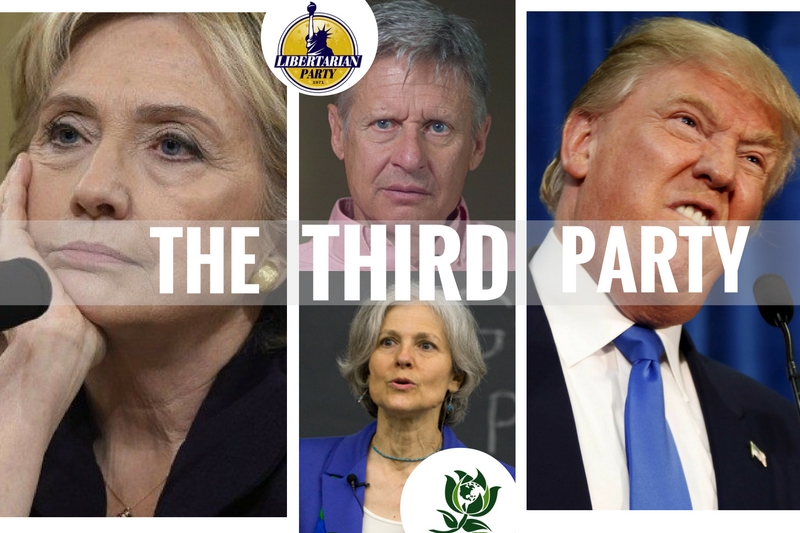By Prashant Shankar
Online Editor
Graphic by Ana Bicolli
For most Americans, this election has been a train wreck that you just can’t look away from. Both Hillary Clinton and Donald Trump have the lowest approval ratings for presidential candidates in modern history, and according to a July AP-GFK poll, at least a quarter of voters are terrified of both candidates. You would think Americans would try to ditch the two-party system, and show more enthusiasm for third parties. But yet, there are so many people on both sides of the aisle that insist you must vote for the “less worse” candidate, even if you don’t like them. The truth is, you don’t have to vote for a Republican or Democrat if you don’t want to.
The largest argument against third party is that voting for a third party “takes away” votes from one of the two main parties. This line of logic is a little frustrating to hear, because it implies that a candidate is entitled to your vote. They aren’t. The idea of a democracy is to vote for the person you like the most, not who you think is going to win or who someone forces you to vote for. Voting for a third party candidate doesn’t help or hurt Clinton’s chances, and it doesn’t help or hurt Trump’s chances. It helps whoever you’re voting for, and that’s that.
Another worry potential third-party voters have is that their vote will still hand a candidate they hate their state’s electoral votes, which is a fair concern, as the goal of the election is to win as many electoral votes as possible. But that argument doesn’t hold up in a state like ours, which is safely in the hands of Democrats, or a state like Kansas, which is overwhelmingly Republican. I wouldn’t blame you if you wanted to stick to the lesser of two evils if you vote in a swing state like Ohio or Florida, but in safe blue or red states, there’s no harm in voting for a third party candidate if they interest you enough. It’s the local and senate races that matter much more than the presidency, especially if you don’t live in a swing state.
A vote for a third party isn’t just a protest vote; there are a few benefits for voting for one. If a candidate is polling above 15 percent around debate time, the candidate is allowed to participate in the presidential debates in the fall. The last time a third party candidate participated in a national debate was Ross Perot of the Reform Party in 1992, who ended up getting 19 percent of the popular vote that year, so it’s not out of the question that a third party candidate could end up on the debate stage. Additionally, if a party gets at least 5 percent of the popular vote, they qualify for federal funding, which could help a minor party grow in influence and power.
There are many third parties on the ballot in most states this November, but the two most significant candidates include are Gary Johnson of the Libertarian Party and Jill Stein of the Green Party. Gary Johnson, a former Governor of New Mexico, has described himself and Libertarianism as “fiscally conservative and socially liberal.” Johnson would be a good fit for those Republicans who can’t stand Trump, or moderates who feel they need to find a middle ground this election cycle. His RCP polling average currents sits at 8.9 percent, so there’s a possibility he reaches the 15 percent threshold to participate in the presidential debates. Jill Stein, Harvard graduate and political activist, doesn’t quite have the political experience the other three have, but is notorious for her progressive viewpoints. She could serve as a decent option for Bernie supporters who can’t stomach voting for Clinton. Her current RCP polling average is just 3.3 percent, so she could also serve as a protest vote to get the Green Party to 5 percent in order to obtain federal funding for future elections.
When you show up to vote this November, keep in mind that you have both the freedom and the opportunity to choose other options, and strike a blow to the two-party system we’ve had for decades.








Destructus • Aug 25, 2016 at 8:29 am
FINALLY THERE’S HOPE!!!!
Don • Aug 25, 2016 at 8:19 am
If I may paraphrase, you’re saying that the impact of a vote for a third party is squarely aimed at potential change in future elections, rather than the outcome of this election. It’s a vote for more viable options in the future. I don’t want to sound cynical, but if only that were possible. I think too many people are too entrenched in their party for that to ever become a reality. We’ve had two parties for well over a century now. I don’t think it’s likely to change. I prefer to think of a vote for a third-party in terms of an article written by political columnist S.E. Cupp earlier this summer. She couldn’t live with herself or defend herself to her new son if she were to vote for either of the current two front-runners. In 4 years, our country will be worse off than it is now, no matter which of them wins. Say what you will about their policies, but neither one will be “Presidential”. Our country’s overseas reputation is about to take a nose-dive. If Clinton wins, her dishonesty and greed will deal a massive hit our credibility and international relations. Domestically, she’s likely to bankrupt us. If Trump wins, his gruff manner and unrealistic policies will alienate several of our allies. Domestically, he’ll probably spend most of his term arguing with Congress. It truly is a choice between two evils.